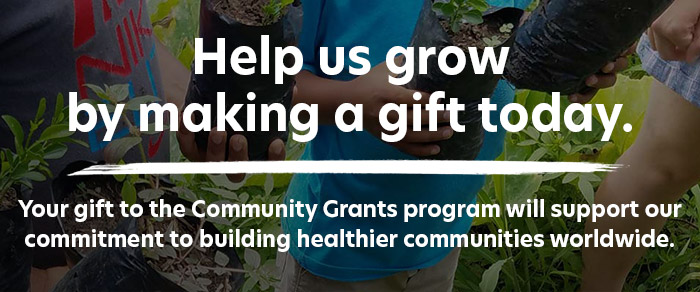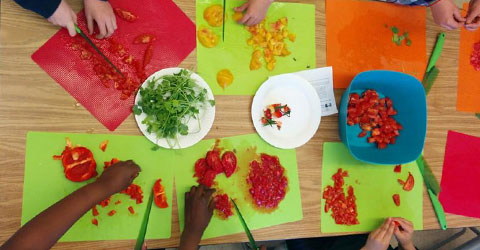
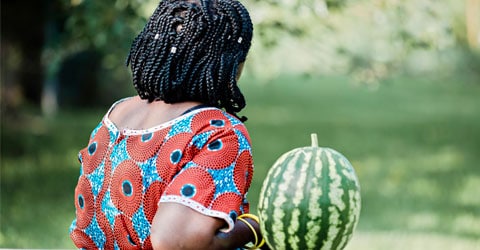
The following is an article from a Community Grant recipient.
Downtown Greens (DTG) is a 2.78-acre, organically-maintained public greenspace in downtown Fredericksburg, Virginia. Founded in 1995, DTG is located in the historically low-income Darbytown neighborhood beside the Boys and Girls Club, Head Start, and two Section 8 housing developments.
It is a natural resource, as well as an important place for hosting community programs and eco clubs, especially for youth. By 2019, only five years after launching our youth programing, we had over 325 children, from preschool to middle school, participating in our Youth Farm Program (YFP), Youth Garden Club (YGC), and Garden Sprouts Program in collaboration with Fredericksburg Area Head Start and Virginia Preschool Initiative. These programs provide hands-on opportunities for children to learn where food comes from, how to grow it, and how to prepare and enjoy it at home.
For the YFP and YGC, we maintain two on-site educational food gardens, dozens of fruit trees, and a small apiary. With the food grown in these gardens by program participants, we contribute to a local community supported agriculture (CSA) program and the local farmers market.
As was the case for so many other organizations, COVID-19 forced us to adapt in 2020. We had to cancel our youth programs for the year and pivot to address the challenges affecting our community during the pandemic. That meant finding new ways to address food insecurity, which disproportionately affects low-income individuals and communities of color. In particular, we wanted to provide fresh produce to our neighbors who could not leave their homes and were struggling to make ends meet. We did what we knew best—we grew food.
We transformed part of our educational YFP garden into a more accessible and efficient raised bed system, and also built a 256 square-foot Take What You Need (TWYN) garden plot by the corner bus stop. We filled both gardens with as many seedlings as we could plant.
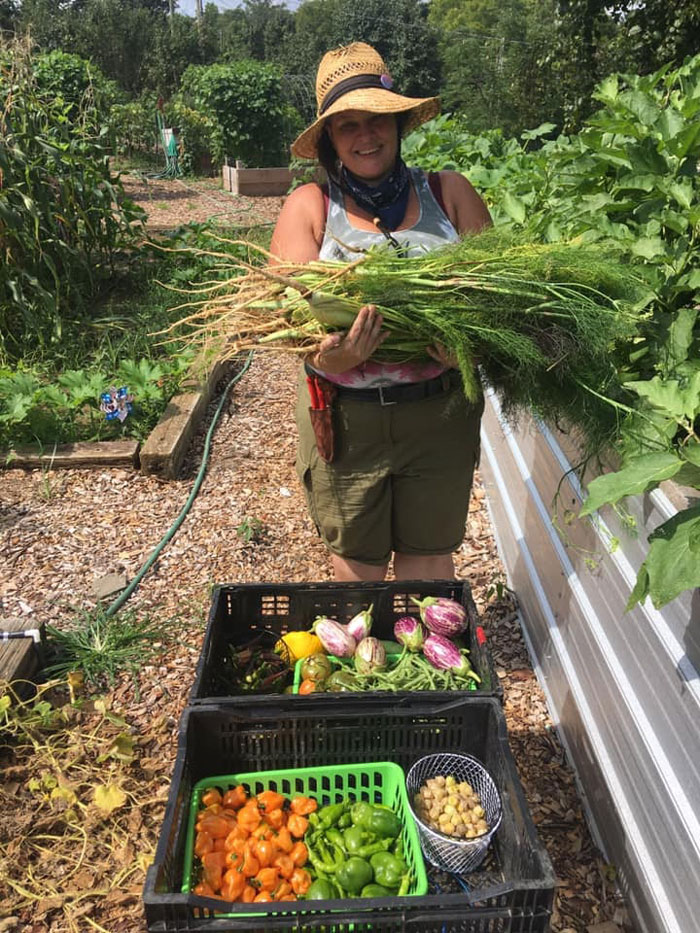
“Take What You Need Garden”
We made the TWYN garden available for anyone to harvest from at any time, not just to increase food production, but also to empower our community to access the fresh produce they needed.
And at first, it took people a little while to get used to the concept of the TWYN garden. Anytime we saw someone pause and look, we called out to them, “Take anything you need, that garden is for you!” and rushed over to show them what was growing, as well as how and when to harvest.
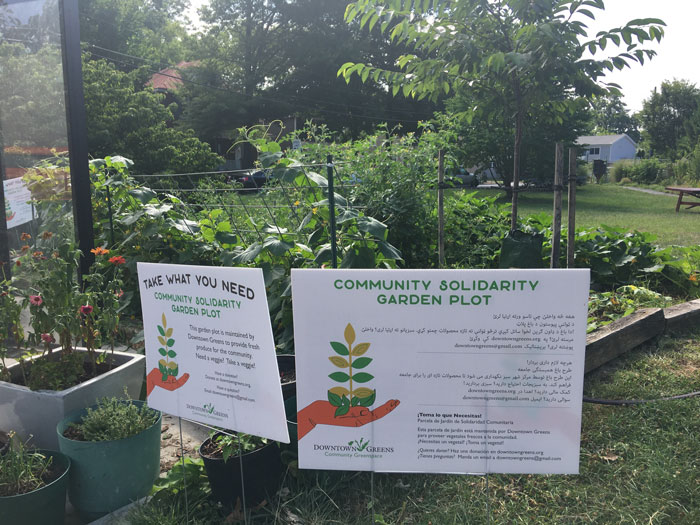
We encouraged folks without homes to take tomatoes, lettuce, and cucumbers, which can be turned into a meal without a cooking range. For neighbors who spoke different languages, we often communicated with the help of their children. If that wasn’t an option, we simply showed them where to find different vegetables and tried pressing them into their arms.
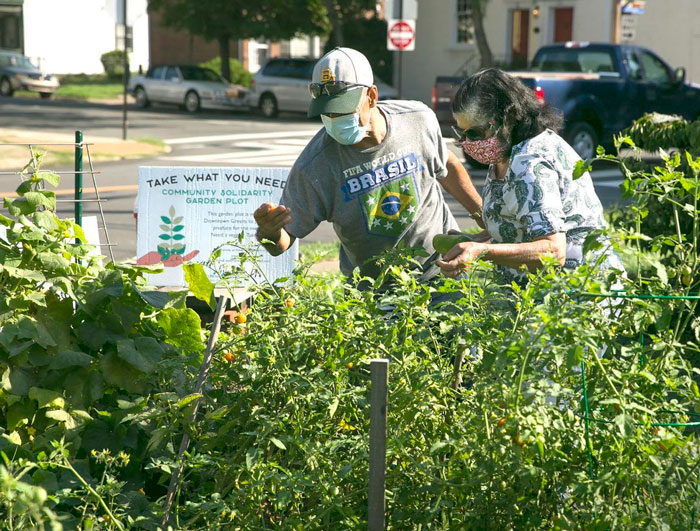
Word spread. The community gradually took ownership of the TWYN garden. People started coming by and picking food on their own. They told us about how they cooked the food they harvested. They munched on cucumbers, or talked about their favorite vegetables, or remembered their grandmother’s garden and, in one case, the huge watermelon they grew as a child. We discussed the differences in gardening where they come from. In other words, even though we were standing six feet apart, divided by tomatoes and other nutritious foods, the garden brought our community, and our stories, together.
Youth Farm Program
Meanwhile, we harvested food from the YFP garden every morning ourselves. At first, we put the day’s harvest in coolers by the sidewalk near the TWYN garden with a little sign that told people to help themselves. Every morning, we filled the coolers and by the next day they were empty again! When the harvests got too big to fit in the coolers, we knew we had to expand our delivery system.
We set up a weekly free farm stand, began hand-delivering boxes to those who would have been in our youth program if not for the pandemic, and worked with other farmers in the area. Some brought eggs, some brought bread, and one very popular person brought cookies. The stand was run by volunteers. At first, it mostly served the surrounding low-income neighborhood, but over time, as word spread, a wider variety of folks started showing up. Eventually, the line was forming an hour before the stand opened! Mothers and grandmothers, fathers and sons, refugees that were new to our country and other people who have never lived outside of Fredericksburg—they all lined up.
Downtown Greens and our gardens might be small, but we are mighty. We’re going to continue to use our power to grow, to give, and to keep connecting with our community.
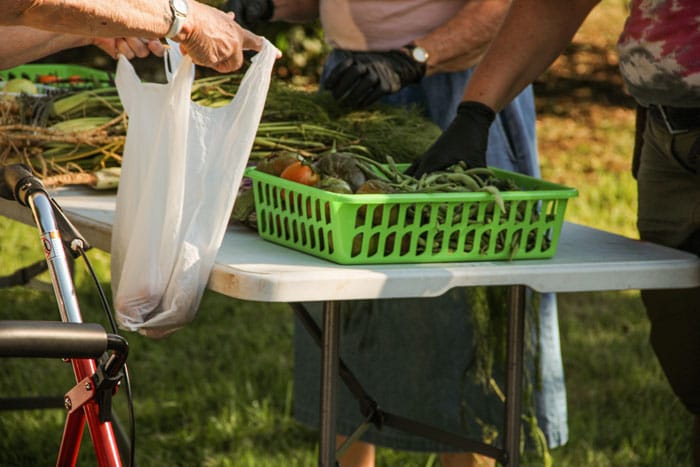
Forging Connections, Building Communities
People exchanged recipes, watched each other’s children, and shared what seems like a universal love for garden ripe tomatoes. In six months of Free Farm Stands, barely a week went by that we didn’t completely run out of food within the hour. We were able to consistently serve 300 neighbors and produce over 1,500 pounds of food. Near the end of the season, when we asked everyone that came through the line, “What do you want to see next year? What else can we grow?” almost every person answered the same: “More.”
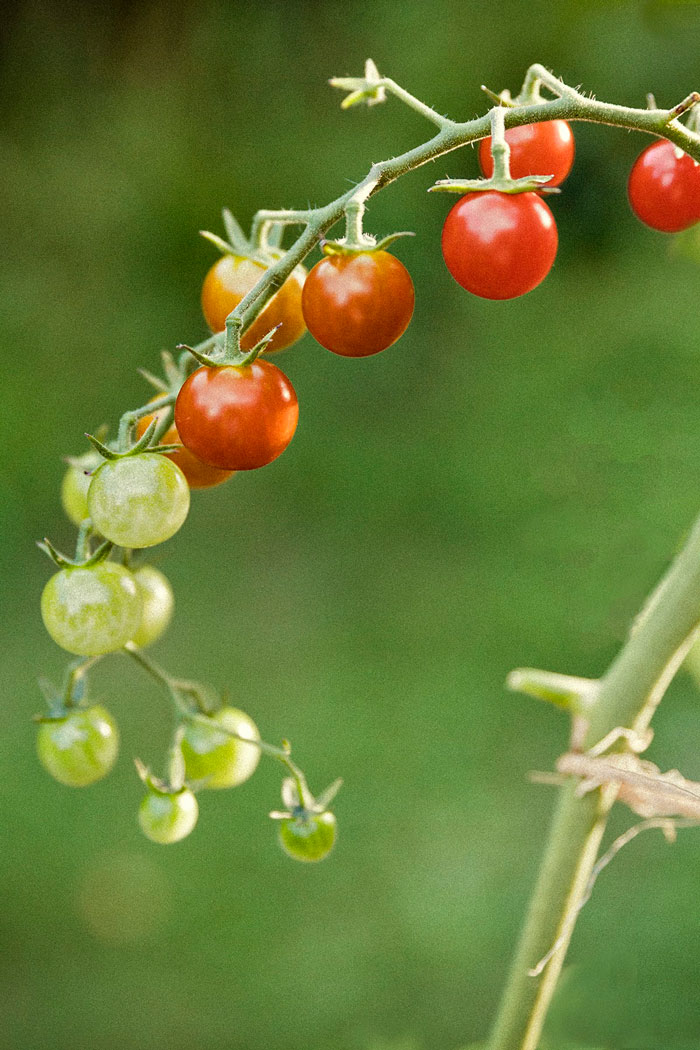
That’s what we hope to provide in the future. After the challenges and successes of 2020, we know how important it is for us to expand our efforts. Thanks to a grant provided by the T. Colin Campbell Center for Nutrition Studies, volunteers have already built raised beds that expand the TWYN garden by 30%. We now have the resources to set an ambitious production goal of 2,000 pounds of fresh produce. We also have the funding to expand our network and nourish relationships with other local farmers and food pantries in the area.
Downtown Greens and our gardens might be small, but we are mighty. We’re going to continue to use our power to grow, to give, and to keep connecting with our community.
The T. Colin Campbell Center for Nutrition Studies (CNS) is committed to increasing awareness of the extraordinary impact that food has on the health of our bodies, our communities, and our planet. In support of this commitment, CNS has created a Community Grant initiative to empower sustainable food-based initiatives around the world by providing grants to enable innovative start-ups and to propel the growth of existing initiatives. Please consider making a donation to this great cause. 100% of your donation will go to support initiatives like the one you just read about in this article.
Copyright 2026 Center for Nutrition Studies. All rights reserved.
Deepen Your Knowledge With Our
Plant-Based Nutrition
Certificate
Plant-Based Nutrition Certificate
- 23,000+ students
- 100% online, learn at your own pace
- No prerequisites
- Continuing education credits


